- Home
- Gordon Korman
Survival Page 3
Survival Read online
Page 3
Abruptly, she stopped swimming and stood on the sandy bottom. She was a fanatic when it came to training. That was how she’d gotten herself booked on the Phoenix in the first place.
On shore she could see Luke and Ian hauling armloads of wood out of the jungle. She felt a twinge of guilt. She should be helping instead of practicing for an event that was never going to take place. The sooner they were finished, the sooner they could continue their search for poor Will.
Bright flashes of silver caught her eye, and she looked down into the waist-deep water. A school of footlong fish darted all around her. She experienced a moment of fear — were they piranhas?
She relaxed. Whatever they were, they seemed just curious, investigating a novel shape in their ocean.
The next thought to flash through her mind was: food. Her years of training had made a healthy eater of her. She’d always said that she could survive happily on nothing but fruit. But after only a couple of days, if she saw another banana or coconut, she was going to scream.
Could she catch a fish with her bare hands? Were these things even edible? Ian would probably know, but by the time she could ask him, the school would be long gone.
It was a cruel reality out here in nature, yet in a way it was very fair. No judges to appeal to, no instant replay. You make a mistake and your boat sinks, or your shelter burns down. If she was going to do this, she had to do it now, without thinking.
A lightning thrust. She stabbed at the water and came up with a wriggling silver body.
Thunderstruck and delighted by her catch, she uttered a piercing shriek and began wading ashore, juggling the fish. Startled by her scream, Luke and Ian raced across the sand to her side.
“What’s the matter?” barked Luke.
“Lunch!” she crowed. “I caught lunch!”
“It’s a small bonito,” put in Ian. They looked blank so he added, “Very edible.”
Lunch thrashed wildly.
“But it’s not dead!” Luke protested.
“Well, make it dead!” she insisted.
Obediently, Luke reached out and slapped the fish over the head with his open hand. The bonito went on struggling.
“Here!” Ian held out a short stick, part of their construction material.
Luke grabbed it and took a swing just as Charla, shocked, pulled back her hands.
Whap!
“Ow!”
Lunch dropped to the wet sand. Before they could react, the bonito flipped its way into an oncoming wave and disappeared into the surf.
“You were supposed to hit the fish, not me!” Charla snapped.
“You moved!” Luke accused.
They stared at each other for a moment and then burst out laughing. Relieved, Ian joined in. As their merriment died down, they heard another sound. Not the usual island noises — insects and birds and the lapping of the waves. This was mechanical — the drone of motor and propellers.
Ian was the first to look up. “A plane!”
It appeared as a dot in the sky that grew bigger and better defined. It was a twin-engine seaplane. And there was no doubt about it — it was heading for their little island.
“They must have seen our fire!” cried Charla, excitement vibrating her thin frame.
Ian frowned. “You know, the chances that we were spotted within a day because of a small bonfire are a million to one. I don’t understand how it could have happened.”
Luke slapped him on the back. “It happened because we got lucky for a change!” he said, choking back tears of emotion. “We’ve got to find Will! Now we can get him to a doctor.”
They ran along the shore, waving their arms and cheering.
The plane roared right over their heads and started across the island, its pontoons barely clearing the tops of the trees.
“Hey, where are they going?” cried Charla.
The aircraft disappeared over the jungle. The castaways waited for it to circle back for them, but it never did. Instead, they heard the engine power cut back, indicating descent. A few minutes later, the noise of the motor disappeared altogether.
Luke was dumbfounded. “Why would they land all the way over there?”
“They didn’t see us,” breathed Charla, devastated.
Ian thought it over. “Maybe they’re not here for us. Maybe there’s a village or outpost on the other side of the island.”
“It’s still good news,” Luke decided. “We just have to get over there and ask them to give us a ride somewhere. Even if there’s no room for us, at least we can get them to send help.”
“What if we can’t find them?” asked Charla.
Luke started out along the beach. “That plane landed in the water. If we follow the shore, we’ll hit it sooner or later. Let’s not waste any time.”
Charla hurried after him.
“Wait,” called Ian. He picked up the stick and wrote WE’RE ALIVE in the hard flat sand by the water’s edge.
“Just in case they come looking for us while we’re gone,” he explained, rushing to catch up with the others.
* * *
What started out as a walk along the beach soon got a lot harder. Just around the bend from their campsite, the sandy shoreline ended, giving way to coral outcroppings and steep cliffs. In places, the rocks were so jagged and unclimbable that the three were forced to venture inland to make it over the rough spots.
“Keep your eyes on the water,” Luke ordered when they had to veer through a dense grove of trees. “We don’t want to walk right by that plane.”
“How far do you think we’ve come?” asked Charla, swatting mosquitoes.
Ian looked thoughtful. “It’s hard to say. We make great time on the beach, but when we have to start climbing, we’re doing more up and down than forward. Three — maybe four miles.”
It was like an obstacle course. Much of the coastline was a series of coves shaped like giant bites out of the shore. These had to be followed around, or sometimes waded through. High rocks bound the inlets, so the castaways were constantly climbing. As they rose with the terrain, their hopes rose with them — only to be dashed when they reached the top. For there lay another identical cove. The view was breathtaking, spectacular. But they had rescue on their minds. Any view that didn’t include the plane was a bitter disappointment.
“I hope they haven’t left already,” said Charla. “We’ve been at this for three hours.”
“We would have heard the engine,” Luke panted, starting down into another inlet.
The next rise was a steep one, becoming a sheer cliff near the top. Luckily, there was a grove of leafy saplings on the crest. Luke was able to hoist Charla high enough to get an arm around one of the narrow trunks. With her gymnastics training, she pulled herself to the top. Then, locking her ankles around the base of the tree, she hung herself downward. This allowed the others to use her as a human ladder. They climbed up her athletic body to the flat area at the summit.
“Look!” breathed Ian, pointing.
It was the seaplane — not in the next cove, but in the one after that. It bobbed gently in a shallow lagoon formed by the curve of the coastline and a high jetty of dead coral. Four men waded in the waist-deep water, unloading crates from the cargo hold.
For nine days, the castaways had seen no living soul other than one another. Now — rescuers. With a plane.
Luke’s heart was pounding in his ears so loudly that he could barely hear his own voice. “Hey! Over here! Over here!”
Charla and Ian began jumping and bellowing.
The four men continued ferrying their cargo. No one looked up.
“We’re too far away!” Ian exclaimed, his throat hoarse from shouting.
Charla was in a full panic. “Let’s get over there!” She started down the steep slope to the next cove so fast that the others, following her, tripped, fell, and rolled all the way to the beach.
They sprinted along the shore, running the anchor leg of a long race. Down at sea level, they could no l
onger see the plane and its four occupants. But Luke kept a vivid picture of them in his mind. It gave his feet wings as he started up the incline, right behind Charla. This was it. Beyond this rise lay rescue.
The slope was rocky, but shorter and much less steep than the last one. Charla leaped expertly from foothold to foothold. Luke was hot on her heels. His hands and knees bled from the sharp coral formations, but he didn’t care. Nothing mattered — nothing except reaching those men.
He could see the top now, just a few feet away. Charla was already reaching for it …
Bang!
The shot echoed six times before Luke stopped counting. His arm snaked out, grabbed Charla by the back of her shirt, and pulled her down beside him. At the same instant, he used his other arm to halt Ian in his tracks.
“What’s the matter with you?” Charla shrilled. “We’re almost there!”
“That was a gunshot!” Luke hissed.
“No, it wasn’t!” she argued. “Maybe the plane backfired or something!”
“Maybe,” Luke said doubtfully. “But we’ve got to find out, one way or the other, before we let them know we’re here.”
Carefully this time, they crept up to the top and peered over the peak.
There was the seaplane. But now there were only three men wading in the lagoon. And one of them, a tall cadaverous figure with bright red hair, was holding a small snub-nosed revolver.
“Where’s the other guy?” Charla whispered urgently.
Then they saw him — floating facedown in the clear water of the lagoon. He wasn’t moving.
They ducked back from the top of the hill. Silently, they put together the sights and sounds of the last few minutes and realized that they equaled death.
Charla looked from face to face. “What? You’re not saying we’re not going down there?”
“We just witnessed a murder!” Luke insisted. “And those guys did it! I don’t think they’re going to be really psyched to see us!”
“I won’t testify against them,” Charla promised. “I know that sounds selfish, but we’re talking about our lives! Will’s life!”
“That’s exactly why we can’t go!” Luke argued. “Look — these are bad people. I don’t know what they’re doing, or what’s in those boxes. But if those guys’ll kill one person, they’ll have no problem killing us!”
Charla began to shiver. “I’m sorry!” she quavered. “But this is so unfair! There are rescuers right here and we can’t even go to them! We’ll never see another plane. Never.”
“It’s unbelievable,” agreed Ian, his voice hollow with shock and disappointment. “It would be better if nobody had come at all.”
Luke nodded grimly. He turned their dilemma over in his mind every which way, but it always came out the same: They would have to conceal themselves from these men; that was definite. But if he, Charla, and Ian were hiding, how could they ever hope to attract rescuers in a passing plane or boat?
It was the only safe path. But would following it condemn them to a lifetime marooned on this terrible island?
Will Greenfield’s “camp” was less than half a mile from his fellow castaways’, in a small clearing in some dense jungle. It wasn’t much of a clearing, but then again, it wasn’t much of a camp. A small fire was the only comfort. Will slept on the cool ground, wedged between tree trunks. A hump created by exposed roots provided his pillow.
Not exactly a four-poster bed, Will reflected, but he didn’t seem to need much sleep anymore. Crazy but true — his bug bites and the on-and-off rain kept him awake; his fear and racing mind kept him alert. He lay down because, in the pitch-dark, there was nowhere he could go without getting lost. Even then, he only dozed off here and there. Mostly, he squinted at the fallen log that stretched over him, suspended a few inches above his chest. In the dim firelight, he could see thousands of ants scurrying across the rotting deadwood. A metropolis of them! They made him even more restless. They all seemed so busy. Watching them marching to and fro filled him with an urgent desire to do something.
The fire helped. Last night he had spent hours using a jagged rock to sharpen straight sticks into arrows. At least it had felt like hours; there was no way to judge time when the sun was down. And at very first predawn light, he was off through the jungle in search of a piece of wood he could use as a bow.
A bow and arrow. Even now, it seemed nuts. Like he’d ever have the guts to shoot at someone!
The idea sobered him up. Those kids were dangerous. He still wasn’t sure how, but they’d gotten him separated from his sister, lost on Guam. They were keeping him from the Phoenix, which might have left without him. His life could be in danger; Lyssa’s too. They were after him, and he was outnumbered, three to one. He needed some kind of weapon to defend himself.
He began testing twigs for their flexibility. The first snapped in his hands, and he dropped it with a yelp of shock. He was a wimp, that was for sure. He’d never even been in a fistfight, except with Lyssa. That was another story. He and Lyssa could really mix it up. No joke. They’d even put each other in the hospital once, which was why they’d been sent on Charting a New Course.
Even though Lyssa was a first-class pain in the butt, he would have given anything to see her face right now. Lyssa was smart. She’d be able to figure out what was going on. Every time he tried to think it through, the mist came back, and with it the terrible headaches.
Aw, Lyss, you’re never here when I need you!
He found a supple green branch that was gnarled into a C-shape. Perfect.
He began experimenting with vines. Most broke at the slightest tension. Those that held up were too stiff. At last he found one with both strength and springiness. Carefully, he plucked off the leaves and knotted the ends to his bow.
Now to test it.
He positioned an arrow against the vine and drew it back. Even though no one was watching, he felt himself reddening. Who did he think he was, Robin Hood? He could almost hear Lyssa taunting him:
If you shoot anything besides yourself with that …
Before he could finish her sentence, there was a violent rustling, and out of the underbrush burst a dark blur.
Will froze in terror. It was one of those wild pigs! No, bigger than that — a boar! It had to be. The thing was a beast, with black fur and a swinelike appearance. It ran at full speed, no holds barred. Will was sent flying as the animal charged at him. Dark blood appeared on the calf of his leg where a sharp tusk had brushed by.
By the time he could scramble back up, the animal was bearing down on him again. Luckily, the boar was as disorganized as it was ferocious. It thundered every which way, turning constantly. Yet each charge was made with the utmost purpose. Gasping and snorting with rage, it wheeled for another assault.
A tree! Will thought desperately. Climb a tree!
In a panic, he looked around. Plenty of trees, but all the close ones were palms — long, smooth trunks, difficult to climb. His eyes fell on the bow, which lay on the ground right where he’d dropped it to make his escape. Where was the arrow?
Then he saw it, partly hidden by a fern. It stuck straight up, its point buried in the soft earth.
In an instant, his mind ran through all the reasons this was a bad idea: You’ll never make it in time. You haven’t tested it yet. You’ll put your eye out. Look at those tusks ….
He dove just as the boar sprang forward. He picked up the bow and rolled, flailing an arm for the arrow. When he felt the stick in his palm, he yanked it out of the ground, sat up, aimed, and let fly.
The arrow shot from its bow at a wild angle, just as the attacking animal leaped. It caught the boar in the side of the snout, right behind its flat nose. Direct hit!
Wham! Will crumpled back to the ground as the animal’s full weight slammed into him. It was on top of him. He could see it, feel it, smell it. He waited for the ripping force of the tusks to tear into him.
And suddenly, the black fur that filled his field of vision was gone. T
he wounded boar reared up like a frightened horse, squealing in pain. Then it turned tail and disappeared into the jungle once more.
Will lay flat, the bow across his stomach, waiting for the beating of his heart to return to normal. When his brain finally unfroze from terror mode, it was to admit a single thought:
I need more arrows. Lots more.
Ian Sikorsky crawled out of the rebuilt shelter, scratching at ant bites and squinting through the brilliant morning at the lean-to’s roof.
Rain had come on and off all last night. Huge clammy droplets had fallen like bombs from the shelter’s ceiling. The three castaways had barely slept a wink. According to the documentary he’d seen, tree bark was supposed to be waterproof. It was a lesson he’d been learning over and over again since the sinking of the Phoenix: Real life wasn’t the same as TV.
He sighed miserably. If he’d come to that conclusion a month ago, Mom and Dad probably never would have sent him on Charting a New Course in the first place.
The thought of his parents, so far away, choked him up a little. Odd, the things he missed the most. The labeled diagram of the solar system that hung on his wall — he couldn’t remember the names of two of Saturn’s moons. His goldfish, Dot and Com. Even his mother’s pot roast, which was practically lethal, and the sound of his father practicing his trombone …
He forced himself to concentrate on the problem at hand. Did the roof need more bark? Different bark? Bigger pieces laid out in a new pattern? Mud for mortar, maybe?
Luke would know. He always knew what to do. It wasn’t that he had so much information — he just knew exactly how to use the information he had. Ian could memorize the encyclopedia and still not be able to come to the courageous decisions that Luke made every day.
If there was one good thing to come out of this horrible situation, it was getting to know a great guy like Luke Haggerty.
The rain began again. At least the Discovery Channel had been right about that. The tropics were wet in the summer.
Look on the bright side, he told himself. Rain meant drinking water.

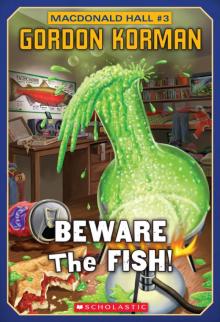 Beware the Fisj
Beware the Fisj Slacker
Slacker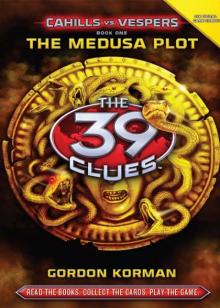 The Medusa Plot
The Medusa Plot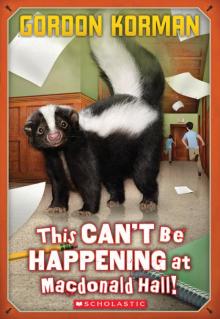 This Can't Be Happening at MacDonald Hall!
This Can't Be Happening at MacDonald Hall!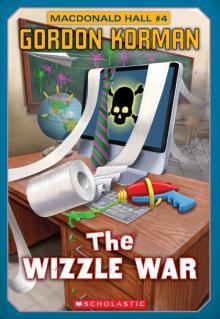 The War With Mr. Wizzle
The War With Mr. Wizzle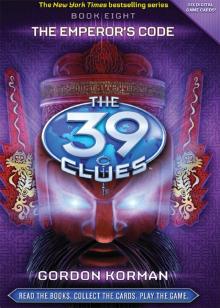 The Emperor's Code
The Emperor's Code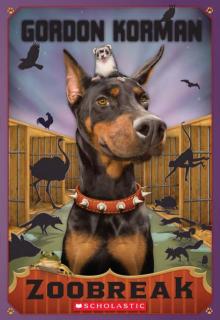 Zoobreak
Zoobreak The Danger
The Danger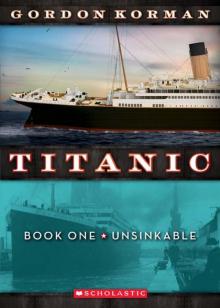 Unsinkable
Unsinkable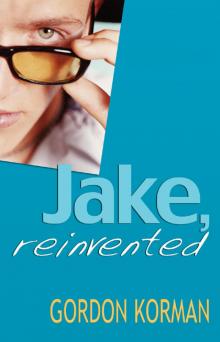 Jake, Reinvented
Jake, Reinvented No More Dead Dogs
No More Dead Dogs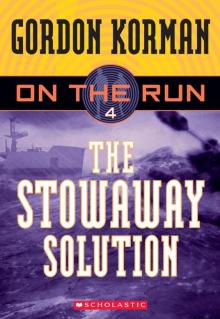 The Stowaway Solution
The Stowaway Solution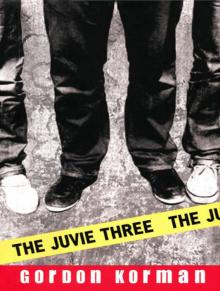 The Juvie Three
The Juvie Three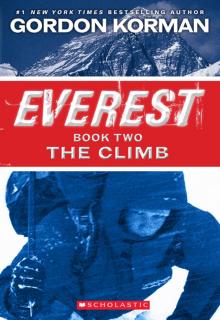 The Climb
The Climb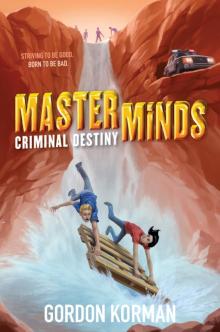 Criminal Destiny
Criminal Destiny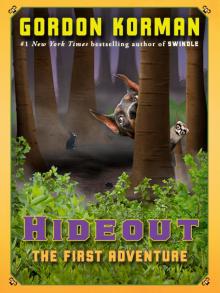 Hideout: The First Adventure
Hideout: The First Adventure Flashpoint
Flashpoint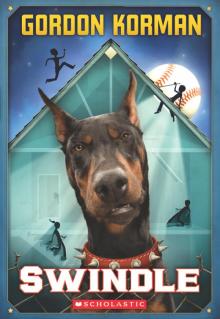 Swindle
Swindle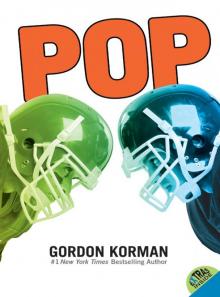 Pop
Pop The Rescue
The Rescue Memory Maze
Memory Maze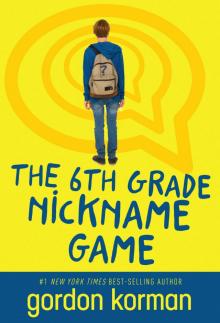 The Sixth Grade Nickname Game
The Sixth Grade Nickname Game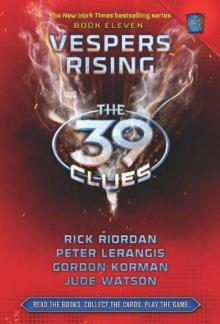 Vespers Rising
Vespers Rising Collision Course
Collision Course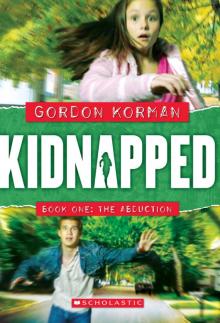 The Abduction
The Abduction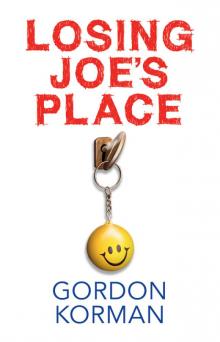 Losing Joe's Place
Losing Joe's Place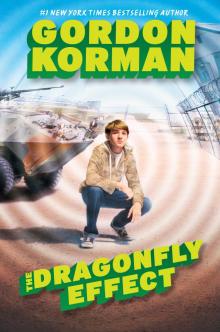 The Dragonfly Effect
The Dragonfly Effect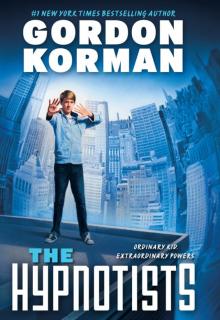 The Hypnotists
The Hypnotists Survival
Survival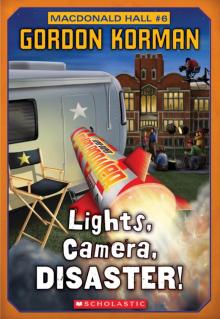 Lights, Camera, DISASTER!
Lights, Camera, DISASTER! Payback
Payback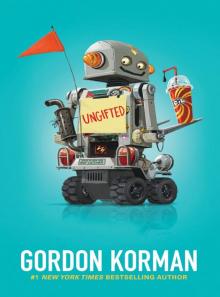 Ungifted
Ungifted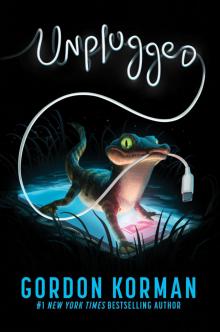 Unplugged
Unplugged Framed
Framed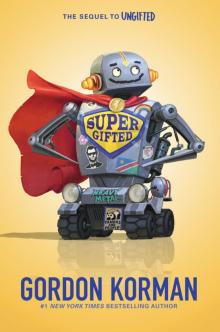 Supergifted
Supergifted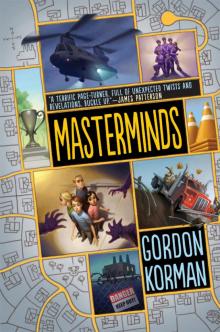 Masterminds
Masterminds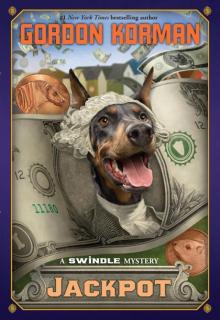 Jackpot
Jackpot Don't Care High
Don't Care High The Deep
The Deep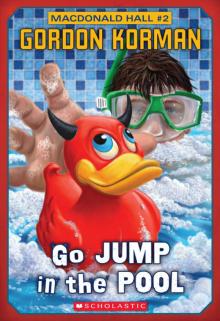 Go Jump in the Pool!
Go Jump in the Pool!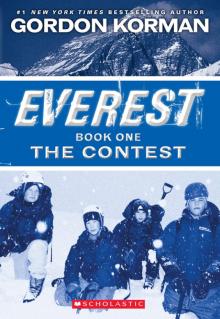 The Contest
The Contest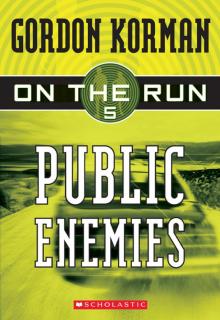 Public Enemies
Public Enemies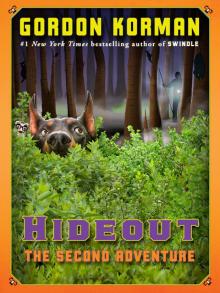 Hideout: The Second Adventure
Hideout: The Second Adventure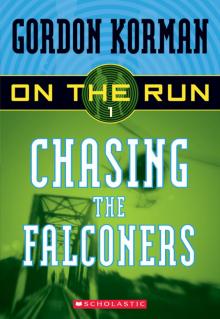 Chasing the Falconers
Chasing the Falconers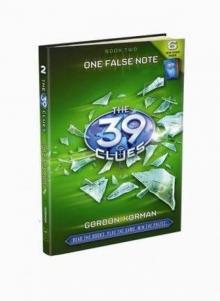 One False Note
One False Note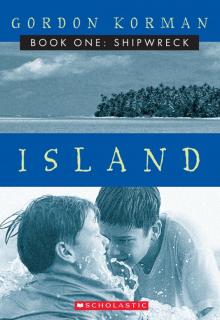 Shipwreck
Shipwreck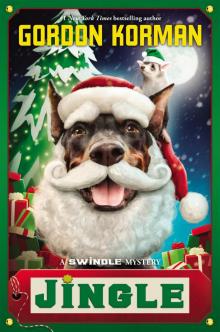 Jingle
Jingle Unleashed
Unleashed Son of the Mob
Son of the Mob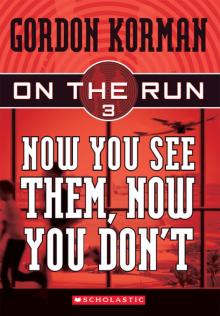 Now You See Them, Now You Don't
Now You See Them, Now You Don't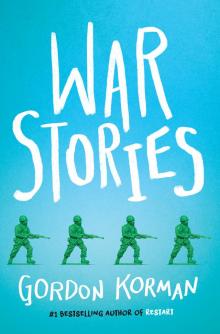 War Stories
War Stories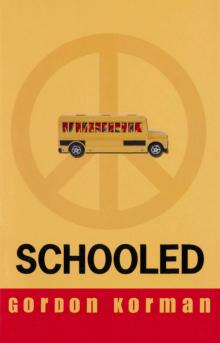 Schooled
Schooled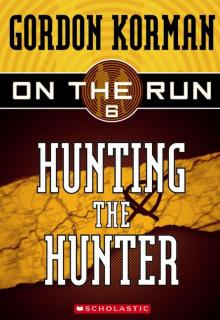 Hunting the Hunter
Hunting the Hunter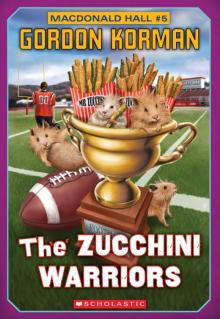 The Zucchini Warriors
The Zucchini Warriors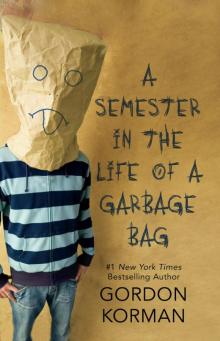 A Semester in the Life of a Garbage Bag
A Semester in the Life of a Garbage Bag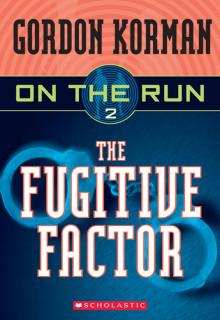 The Fugitive Factor
The Fugitive Factor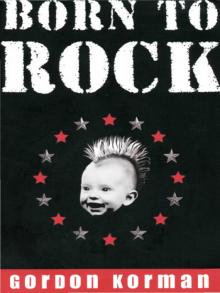 Born to Rock
Born to Rock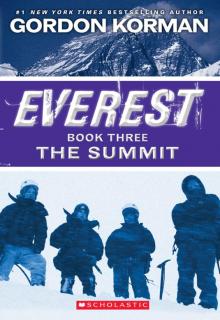 The Summit
The Summit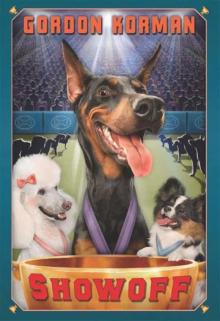 Showoff
Showoff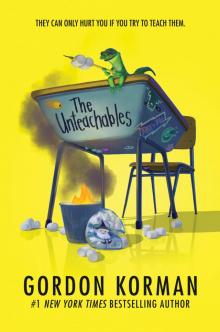 The Unteachables
The Unteachables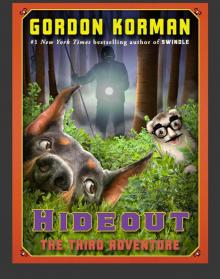 The Third Adventure
The Third Adventure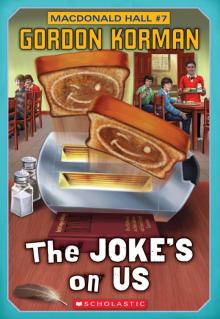 The Joke's on Us
The Joke's on Us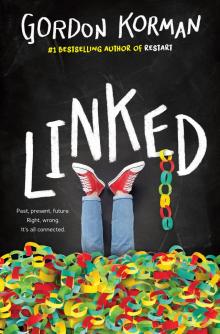 Linked
Linked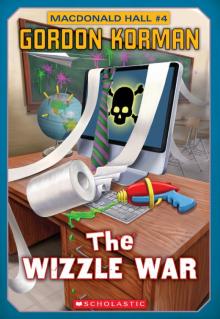 The Wizzle War
The Wizzle War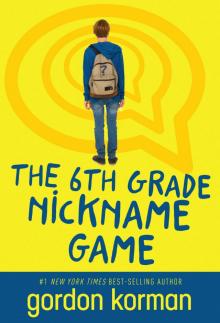 The 6th Grade Nickname Game
The 6th Grade Nickname Game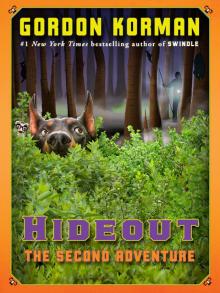 The Second Adventure
The Second Adventure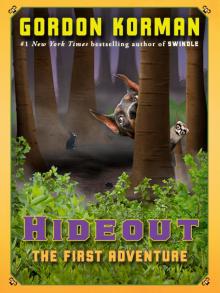 The First Adventure
The First Adventure![39 Clues : Cahills vs. Vespers [01] The Medusa Plot Read online](http://i1.bookreadfree.com/i2/04/10/39_clues_cahills_vs_vespers_01_the_medusa_plot_preview.jpg) 39 Clues : Cahills vs. Vespers [01] The Medusa Plot
39 Clues : Cahills vs. Vespers [01] The Medusa Plot